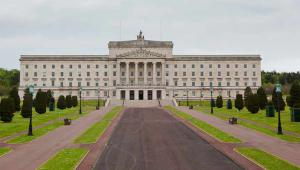
Belfast. Image © iStock
Elections in Northern Ireland are always billed as a moment of change and the next polling day is no exception.
But there are limited choices available and voters know it.
Anyone expecting big changes at the heart of Westminster will be disappointed as there will be just 18 MPs and Sinn Fein representatives won’t be taking up their seat.
The big question occupying the national media is just how many of them won’t be turning up to take their seats. If the polls are right, the party could be the biggest winner of seats.
But the bigger question is what will they be able to achieve given there is a backlog of demand due to the shutdown of Stormont and there won’t be any new money. That comes despite the government’s pledge of a dividend after power-sharing started again.
The NI think-tank Pivotal said: “While total funding in 24-25 is up 7% on the budget set at the start of last year, it is 2% less than the total amount spent by depts by the end of last year. So there is no uplift at all on the amount actually spent last year.”
It added: “There is nothing available to pay for new spending unless it can be found by cutting existing spending or efficiencies.”
One local independent media outlet described Northern Ireland as “the punchbag of austerity”.
Critical issue is the level of top-up funding that comes from Westminster. Northern Ireland gets in 2024-25:
- Department of Health – £7.76bn
- Department of Education – £2.87bn
- Department of Justice – £1.26bn
- Department for Communities – £856.0m
- Department for the Economy – £766.6m
- Department of Agriculture, Environment and Rural Affairs – £577.3m
- Department for Infrastructure – £559.5m
- Department of Finance – £208.1m
- The Executive Office - £183.2m
But it isn’t enough, due to decades of under-funding, Covid-19 and then the Stormont shutdown.
The police service is facing critical pressures, according to the leader of the Police Federation of Northern Ireland.
Chair, Liam Kelly, said: “I understand that communities that are affected will view this decision with dismay and disappointment. That said, severe cuts in service levels are the outworking for an organisation that faces a deficit of £130m.
“Something has to give if core policing services are to be maintained with the diminishing resources that are available. This is the inevitable consequence of budget pressures, but it will fall far short of what’s required if the Service is to attempt to balance the books.”
When officials were making decisions by order of Westminster, health was the only service that was given priority for spending. But even so, today the projections are grim.
Local activists complain of eight-year waiting lists and seven hour waits for ambulances.
The Healthcare Financial Management Association said: “Northern Ireland Department of Health's budget allocation for 2024-25 represents a 2.3% reduction in funding compared to expenditure in 2023-24. The Department had estimated it needed an extra £1bn on top of last year’s opening budget, after allowing for £200m of savings and anticipated additional income.”
And in education budgets, there are also problems. At the end of last year, the Independent Review of Education in Northern Ireland forecast a gap of £155m to get level with England and Wales plus a further gap of £136m to cover SEND demand which is higher than most of the UK.
So what’s likely to change?
There are 136 candidates standing for the 18 seats. Two seats representing Belfast and the Lagan Valley previously held by former DUP leader Jeffrey Donaldson are where observers are watching the closest.
Adding to the interest is that some parties have agreed not to stand in specific seats and tactical voting is strong.
Conor Murphy, Sinn Féin’s director of elections, is on record calling for voters to back “progressive parties who will reject Tory cuts and Tory pacts”.
Unionist leaders have said they want to work better together – a recognition that they are under electoral pressure and haven’t responded well to political scandals.
The DUP has pledged to support 20,000 jobs in the next five years, fix the NHS and remove the Northern Ireland protocol.
Ulster Unionist Party wants to make Northern Ireland work by developing infrastructure and housing.
The SDLP has pledged to hold both Stormont and Westminster to account, particularly over funding decisions.
The Alliance party has pledged to push for better childcare. A key figure for the party is Naomi Long who has served as justice minister.
Sinn Féin has made housing its big campaign concern.
It said: “The deepening housing crisis by focussing on the delivery of affordable homes. This includes provision for an additional €1.4bn of capital expenditure and €300m Approved Housing Body borrowing to deliver 21,000 social, affordable-rental and affordable-purchase homes next year.”
Polling is predicting it could become the largest party – but it will continue its policy of not taking up seats, although its representatives do run constituency offices.
The surprise story of the election came after the sitting Sinn Fein MP for Fermanagh and Tyron, Michelle Gildernew, stood down.
Her replacement is Pat Cullen, the former head of the Royal College of Nursing. Her expertise both in terms of the NHS and as a national figure is significant.
But settling the colours of seats won’t tackle the big issues that have impacted on generations of people both during and after The Troubles.
The Nevin Economic Research Institute has argued that transitioning to high value sectors could contribute to building more productive economy. Currently, the service sector and food production dominate.
“Certain sectors produce less or more with the same inputs either by design or by choice,” it said. “That means a re-examination of economic supports, including tax expenditures in order to align them with a plan to build a more productive economy.”
The most likely starting point is a review of local revenue raising, which is also in line with pressure in Westminster. Could the Stormont assembly follow the example of Wales or even start the reforms themselves?
Pivotal said: “If we want to fund more public services, where is the money coming from? We shouldn’t shut down the conversation about revenue raising without even considering the choices and options. While many households are already very stretched, there are some people in NI who could afford to pay more.”










